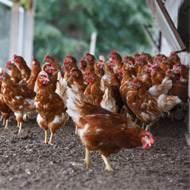H5N8 outbreaks ‘unprecedented’, Defra concludes

To date, there have been over 1,000 reported poultry outbreaks and nearly 1,500 wild bird findings.
Contact with wild birds is the most likely source of the majority of recent H5N8 avian influenza outbreaks on UK premises, according to an epidemiological investigation by Defra.
The report focused on the initial phase of the outbreak, from December 2016 to March 2017, during which time there were 10 infected premises in England and Wales. Areas affected were Lincolnshire, Lancashire, Suffolk, Carmarthenshire, Yorkshire and Northumberland.
Defra concluded that all of the outbreaks, apart from those in Lancashire which took place at gamebird premises, were independent events that occurred as a result of direct or indirect primary incursions from wild birds.
The infected premises in Lancashire are considered to have originated from direct or indirect primary incursion of H5N8 from wild birds, with subsequent spread between related premises, which took place as a result of business activities.
Extensive epidemiological investigations did not detect infection on any further premises that had connections with infected premises, either through known contacts or proximity.
Defra considers there to be a low risk of incursion of wild birds onto an individual premises, and this is largely influenced by the effectiveness of biosecurity measures.
H5N8 was first detected in the Eastern EU in wild birds and poultry in late October last year. Given the migration patterns of wild migratory waterfowl, the UK’s risk level was increased from low to medium in November. Over the months that followed, outbreaks were detected in wild birds and poultry in most member states - including the UK - as well as neighbouring countries in the Middle East, North Africa and East Europe.
To date, there have been over 1,000 reported poultry outbreaks and nearly 1,500 wild bird findings. Defra says this is an unprecedented level of highly pathogenic avian influenza, even more so than the epizootic of H5N1 in 2005-6. The broader range of wild bird species affected and the high pathogenicity were also unusual.
There remains some uncertainty as to the risk posed by wild birds, and when and where any future cases may occur. There is evidence that this strain is still circulating in Europe, therefore Defra concludes there is ‘an increased risk of another outbreak occurring in poultry on individual premises depending on the level of biosecurity’.



 RCVS Knowledge has welcomed Professor Peter Cockcroft as editor-in-chief for Veterinary Evidence.
RCVS Knowledge has welcomed Professor Peter Cockcroft as editor-in-chief for Veterinary Evidence.